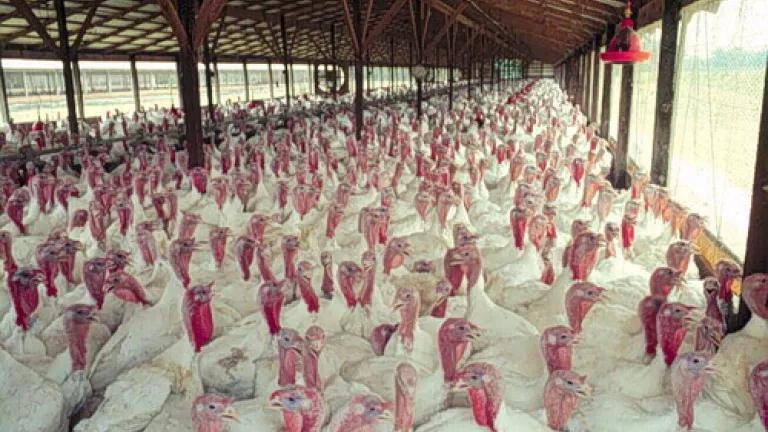Turkey recall highlights grave risks of FDA's delayed action on antibiotic use on healthy livestock

image courtesy Soil Science, via Flickr
I went away for vacation and came back to headlines about a nationwide recall of turkey meat contaminated with an antibiotic-resistant Salmonella strain linked to at least 78 illnesses and to one death across 26 states. Twenty two people have been hospitalized.
The outbreak has led to the recall of 36 million pounds of turkey, one of the largest meat recalls on record. The Salmonella strain in the turkey meat has been found to be resistant to commonly used antibiotics, including ampicillin and tetracyline.
Antibiotic resistance makes infections – food-borne or otherwise –harder to treat and can increase the risk of hospitalization and the risk that known treatments will fail, as a spokesperson for the Centers for Disease Control (the CDC) pointed out.
The headlines are both cautionary and frustrating.
Cautionary because it is a reminder of the risks of the widespread and indiscriminate use of antibiotics on healthy livestock animals in the United States, which comprises 70% of all antibiotic sales in the U.S. and is a major factor in the rise of antibiotic-resistant “superbugs” that the CDC has identified as a major public health threat and one of its biggest concerns.
And frustrating because there is a lot that can and should be done to reduce the risks that the Food and Drug Administration (FDA) has known about for more than three decades but has failed to follow through on.
Routine, low-dose use of antibiotics on healthy animals creates a greater risk for the emergence of antibiotic resistance—essentially, what doesn’t kill the “bugs” makes them stronger.
FDA has known since at least the 1970s that the use of antibiotics on healthy animals—to help them put on weight more quickly and to compensate for dirty, crowded conditions—poses a risk to human health by creating conditions that facilitate the emergence of antibiotic-resistant “superbugs.”
In fact, a lawsuit that NRDC and its partners filed earlier this year specifically challenges FDA’s failure to follow through on its legal obligations to disallow the use of penicillin and most tetracyclines in animal feed once FDA found in 1977 that the use of these antibiotics in the feed of healthy animals can pose a risk to human health. FDA found that the use of penicillin can lead to resistance to ampicillin, one of the antibiotics to which the Salmonella strain carried by the recalled turkey has been found to be resistant. FDA also found in 1977 that the use of tetracylines was leading to emergence of bacteria resistant to this antibiotic. Tetracyline is one of the other antibiotics to which the Salmonella in the recalled turkey has been found to be resistant.
Let me repeat that very clearly: In 1977—34 years ago—FDA foresaw the potential for exactly the risks that have played out in this outbreak, but did not carry out its legal obligation to reduce the risks of antibiotic resistance. FDA determined that the use of antibiotics on healthy animals could reduce the effectiveness of precisely the drugs that last week’s turkey meat Salmonella outbreak was resistant to. And FDA still let it happen.
It is high time for FDA to step up and protect public health as it is supposed to by stopping the unnecessary practice of using antibiotics in the feed and water of healthy animals, thus putting us all at greater risk. Other countries are doing it, and so should we.

